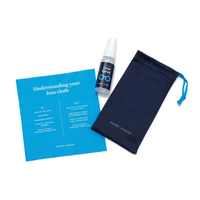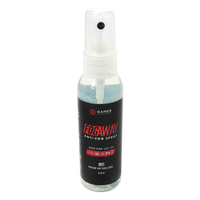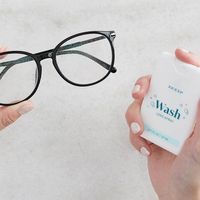Before we answer that, let’s ask another question: why do glasses fog up in the first place? Well, without diving too far into the science, your glasses fog up when you wear a face mask (opens in new tab) because your warm breath is escaping the top of the mask and hitting the cool surface of your lenses. Condensation then forms, hence the pesky fogging. Many Americans are jumping ship and exploring the best contact lenses online (opens in new tab) instead, but there are ways to stop steamy lenses. Read on now for our tips on how to keep your glasses from fogging up when wearing a mask, and to discover how anti-fog sprays could help - and when to leave them well alone.
How to keep your glasses from fogging up
Did you hear the one about using soap and water to create a thin, anti-fog film? Yeah, us too (actually, that one is often used by healthcare professionals). Over the past year we’ve come across many approaches to stop lens fogging, but here’s the thing: prescription eyewear is expensive, so we need to be careful when putting anything on those lenses that could end up damaging them. So before we get to that point, let’s look at some other ways to lift the fog… Buy a well-fitting face mask The most important thing you can do to stop foggy lenses is to ensure you have a good-fitting face mask. If your face covering doesn’t fit securely over your nose, you’re going to look like you’re permanently sat in a steam room while wearing your specs. A mask with a moldable nose bridge is your friend here. With these types of coverings you can ‘pinch to fit’ the nose bridge so that it’s flush against your face. Your warm breath then has less chance to escape out the top of the mask and fog up your glasses. If you’re a crafty type who enjoys making their own homemade face coverings (opens in new tab), explore patterns that enable you to insert nose bridges. Pipe cleaners and twist ties are common materials for bridges and could help stop your glasses fogging up. Use your glasses as a warm-air barrier This involves using your glasses to seal off the top of your mask. The weight of your specs pushing down on the mask should stop most of the warm air escaping from inside the covering, but it isn’t as comfortable or effective as wearing a mask with a proper nose bridge. Why not? You have to wear the mask higher up on your face (much nearer to your eyes), and you may have to wear your glasses a little lower to sit on top of the fabric properly. It’s all just a bit awkward. Ok, so it isn’t a long-term solution, but if you don’t own a mask with a nose bridge, and you don’t have time to try other ways to stop your glasses from fogging up, give it a shot. Some folks have also taken to taping their mask down around the bridge of their nose using medical tape. Be careful with this one if you have sensitive skin. Again, it’s better to buy a mask with a nose bridge that can be pinched to fit. Ask your eye doctor about anti-fog eyeglasses and coatings Yes they exist, but they can often be expensive because the coating (the anti-fog lens treatment) is specialist. Some anti-fog glasses also require a specially formulated anti-fog solution to be applied once a week to the lenses. Zenni, for example, now sells an Anti-Fog + Anti-Reflective Coating for select lenses, with prices starting from $12.95 (opens in new tab). This clever coating reduces glare and fogging on your lenses.
Should you use anti-fog spray for glasses?
We’ve been through our fair share of anti-fog sprays and gels over the past several months, and they have their uses. However, some of them aren’t worth the money, so if you’re wondering whether an anti-fog spray is the answer to how to keep your glasses from fogging up, it depends. You first need to ensure that it’s safe to use an anti-fog treatment on your lenses. Again, prescription eyewear is expensive, so read the ingredients on any anti-fog spray or gel before buying. Here are a few worth checking out… If you don’t yet have coverage, we’d recommend reading our guide to the best vision insurance (opens in new tab) to discover how coverage could benefit you.



